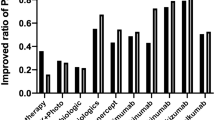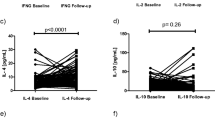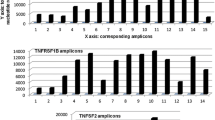Abstract
MTX in genetically distinctive Chinese psoriatic patients remains less explored. The present study aimed to determine the impact of HLA-Cw*06 on MTX response in a Chinese psoriasis patient population. A total of 204 patients with psoriasis were enrolled in this study. Clinical data and DNA samples from all patients were collected. The allele of HLA-Cw*06 genotyping was detected using direct Sanger sequencing. This study enrolled 204 patients with psoriasis, including 47 (23.04%) psoriatic arthritis patients, 157 (76.96%) patients free of psoriatic arthritis. Overall, 110 (53.92%) of all patients carried the HLA-Cw*06 allele. This frequency in patients with arthritis-free psoriasis was higher than that in those with psoriatic arthritis (58.59 vs. 38.30%, P = 0.014). After 8 weeks of MTX treatment, the arthritis-free psoriasis patients, who tested positive for the HLA-Cw*06 allele, showed significant improvement compared to those who tested negative (For PASI50, 78.57 vs. 55.22%, P = 0.02, and for PASI75, 51.11 vs. 34.33%, P = 0.036). The psoriatic arthritis-free patients who carried the HLA-Cw*06 allele in combination with the ABCB1 rs1045642 CC genotype showed the highest improvement. A regression model containing HLA-Cw*06, rs1045642T > C, and initial PASI scores was used to construct the efficacy prediction model of MTX, which yielded AUC values of 73.2 and 75.6% for PASI50 and PASI75 to MTX, respectively, in arthritis-free psoriasis patients. The HLA-Cw*06 allele is associated with optimal response to MTX treatment in arthritis-free Chinese psoriasis patients. When combined with clinical indicators, the polymorphism explained more than 75% of the individual efficacy differences.

Similar content being viewed by others
Data availability
The data that support the findings of this study are available from the corresponding author upon reasonable request.
References
Michalek IM, Loring B, John SM (2017) A systematic review of worldwide epidemiology of psoriasis. J Eur Acad Dermatol Venereol: JEADV 31(2):205–212
Parisi R, Symmons DP, Griffiths CE, Ashcroft DM (2013) Global epidemiology of psoriasis: a systematic review of incidence and prevalence. J Invest Dermatol 133(2):377–385
Tsai TF, Wang TS, Hung ST, Tsai PI, Schenkel B et al (2011) Epidemiology and comorbidities of psoriasis patients in a national database in Taiwan. J Dermatol Sci 63(1):40–46
Armstrong AW, Read C (2020) Pathophysiology, clinical presentation, and treatment of psoriasis: a review. JAMA 323(19):1945–1960
Ding X, Wang T, Shen Y, Wang X, Zhou C et al (2012) Prevalence of psoriasis in China: a population-based study in six cities. Eur J Dermatol : EJD 22(5):663–667
Bedoui Y, Guillot X, Sélambarom J, Guiraud P, Giry C et al (2019) Methotrexate an old drug with new tricks. Int J Mol Sci 20(20):5023
Alqarni AM, Zeidler MP (2020) How does methotrexate work? Biochem Soc Trans 48(2):559–567
Kalb RE, Strober B, Weinstein G, Lebwohl M (2009) Methotrexate and psoriasis: 2009 national psoriasis foundation consensus conference. J Am Acad Dermatol 60(5):824–837
Lebwohl M (2005) A clinician’s paradigm in the treatment of psoriasis. J Am Acad Dermatol 53(1 Suppl 1):S59-69
Jiang B, Yan LJ, Wu Q (2019) ABCB1 (C1236T) polymorphism affects P-glycoprotein-mediated transport of methotrexate, doxorubicin, actinomycin D, and etoposide. DNA Cell Biol 38(5):485–490
Wang Z, Zhang N, Chen C, Chen S, Xu J et al (2019) Influence of the OATP polymorphism on the population pharmacokinetics of methotrexate in Chinese patients. Curr Drug Metab 20(7):592–600
Ranganathan P, Culverhouse R, Marsh S, Mody A, Scott-Horton TJ et al (2008) Methotrexate (MTX) pathway gene polymorphisms and their effects on MTX toxicity in Caucasian and African American patients with rheumatoid arthritis. J Rheumatol 35(4):572–579
Chen M, Chen W, Liu P, Yan K, Lv C et al (2020) The impacts of gene polymorphisms on methotrexate in Chinese psoriatic patients. J Eur Acad Dermatol Venereol: JEADV 34(9):2059–2065
Zhou F, Zhang X (2018) Major histocompatibility complex and psoriasis. J Investig Dermatol Symp Proc 19(2):S79-s80
van Vugt LJ, van den Reek J, Coenen MJH, de Jong E (2018) A systematic review of pharmacogenetic studies on the response to biologics in patients with psoriasis. Br J Dermatol 178(1):86–94
Gudjonsson JE, Karason A, Runarsdottir EH, Antonsdottir AA, Hauksson VB et al (2006) Distinct clinical differences between HLA-Cw*0602 positive and negative psoriasis patients–an analysis of 1019 HLA-C- and HLA-B-typed patients. J Invest Dermatol 126(4):740–745
Fan X, Xiao FL, Yang S, Liu JB, Yan KL et al (2007) Childhood psoriasis: a study of 277 patients from China. J Eur Acad Dermatol Venereol: JEADV 21(6):762–765
Dand N, Duckworth M, Baudry D, Russell A, Curtis CJ et al (2019) HLA-C*06:02 genotype is a predictive biomarker of biologic treatment response in psoriasis. J Allergy Clin Immunol 143(6):2120–2130
Talamonti M, Galluzzo M, Zangrilli A, Papoutsaki M, Egan CG et al (2017) HLA-C*06:02 does not predispose to clinical response following long-term adalimumab treatment in psoriatic patients: a retrospective cohort study. Mol Diagn Ther 21(3):295–301
Gyulai R, Bagot M, Griffiths CEM, Luger T, Naldi L et al (2015) Current practice of methotrexate use for psoriasis: results of a worldwide survey among dermatologists. J Eur Acad Dermatol Venereol: JEADV 29(2):224–231
Yu Q, Tong Y, Cui L, Zhang L, Gong Y et al (2019) Efficacy and safety of etanercept combined plus methotrexate and comparison of expression of pro-inflammatory factors expression for the treatment of moderate-to-severe plaque psoriasis. Int Immunopharmacol 73:442–450
Indhumathi S, Rajappa M, Chandrashekar L, Ananthanarayanan PH, Thappa DM et al (2016) The HLA-C*06 allele as a possible genetic predisposing factor to psoriasis in South Indian Tamils. Arch Dermatol Res 308(3):193–199
Fan X, Yang S, Sun LD, Liang YH, Gao M et al (2007) Comparison of clinical features of HLA-Cw*0602-positive and -negative psoriasis patients in a Han Chinese population. Acta Derm Venereol 87(4):335–340
Bergboer JG, Oostveen AM, de Jager ME, den Heijer M, Joosten I et al (2012) Paediatric-onset psoriasis is associated with ERAP1 and IL23R loci, LCE3C_LCE3B deletion and HLA-C*06. Br J Dermatol 167(4):922–925
Jin Y, Yang S, Zhang F, Kong Y, Xiao F et al (2009) Combined effects of HLA-Cw6 and cigarette smoking in psoriasis vulgaris: a hospital-based case-control study in China. J Eur Acad Dermatol Venereol: JEADV 23(2):132–137
Chandra A, Lahiri A, Senapati S, Basu B, Ghosh S et al (2016) Increased risk of psoriasis due to combined effect of HLA-Cw6 and LCE3 risk alleles in Indian population. Sci Rep 6:24059
Kim TG, Lee HJ, Youn JI, Kim TY, Han H (2000) The association of psoriasis with human leukocyte antigens in Korean population and the influence of age of onset and sex. J Invest Dermatol 114(2):309–313
Tsai TF, Hu CY, Tsai WL, Chu CY, Lin SJ et al (2002) HLA-Cw6 specificity and polymorphic residues are associated with susceptibility among Chinese psoriatics in Taiwan. Arch Dermatol Res 294(5):214–220
Gandhi G, Buttar BS, Albert L, Hasan Q, Aggarwal RK (2011) Psoriasis-associated genetic polymorphism in North Indian population in the CCHCR1 gene and in a genomic segment flanking the HLA-C region. Dis Markers 31(6):361–370
Cibulova A, Zajacova M, Fojtikova M, Stolfa J, Sedova L et al (2013) The HLA-Cw*06 allele and -1149 G/T polymorphism of extrapituitary promoter of PRL gene as a possible common genetic predisposing factors to psoriasis vulgaris and psoriatic arthritis in Czech population. Rheumatol Int 33(4):913–919
Zhang Y, Ding X, Meng Z, Chen M, Zheng X et al (2021) A Genome-wide association study identified HLA-C associated with the effectiveness of methotrexate for psoriasis treatment. J Eur Acad Dermatol Venereol 35(12):e898–e900
Yan KX, Zhang YJ, Han L, Huang Q, Zhang ZH et al (2019) TT genotype of rs10036748 in TNIP1 shows better response to methotrexate in a Chinese population: a prospective cohort study. Br J Dermatol 181(4):778–785
West J, Ogston S, Berg J, Palmer C, Fleming C et al (2017) HLA-Cw6-positive patients with psoriasis show improved response to methotrexate treatment. Clin Exp Dermatol 42(6):651–655
Acknowledgements
This work is supported by Grants from National Natural Science Foundation of China (81974479, 81773329, 82073447), National Key Research Grant (2018YFC0117004). We sincerely thank the participating patients and the volunteers for their generous and enthusiastic support for this study. We are also very grateful to Huashan Hospital of Fudan University for providing some of the samples.
Author information
Authors and Affiliations
Contributions
MM, WZ, WC and XC: contributed to the study design, analysis, and manuscript writing, and MM contributed to data preparation. YK, WZ, MC, CL and KY: contributed to the clinical interpretation of the study findings. MM and PL: proposed statistical analysis methods and undertook the analysis. YL and CL: were responsible for verifying the underlying data. WZ and XC: secured the funding for the study. All authors had full access to all the data in the study and had final responsibility for the decision to submit for publication.
Corresponding authors
Ethics declarations
Conflict of interest
The authors have no conflict of interest to declare.
Ethical approval
This study was then assigned the registration number ChiCTR-OCH-14004518 in the Chinese Clinical Trial Registry.
Additional information
Publisher's Note
Springer Nature remains neutral with regard to jurisdictional claims in published maps and institutional affiliations.
Rights and permissions
Springer Nature or its licensor (e.g. a society or other partner) holds exclusive rights to this article under a publishing agreement with the author(s) or other rightsholder(s); author self-archiving of the accepted manuscript version of this article is solely governed by the terms of such publishing agreement and applicable law.
About this article
Cite this article
Mao, M., Kuang, Y., Chen, M. et al. The HLA-Cw*06 allele may predict the response to methotrexate (MTX) treatment in Chinese arthritis-free psoriasis patients. Arch Dermatol Res 315, 1241–1247 (2023). https://doi.org/10.1007/s00403-022-02498-x
Received:
Revised:
Accepted:
Published:
Issue Date:
DOI: https://doi.org/10.1007/s00403-022-02498-x




